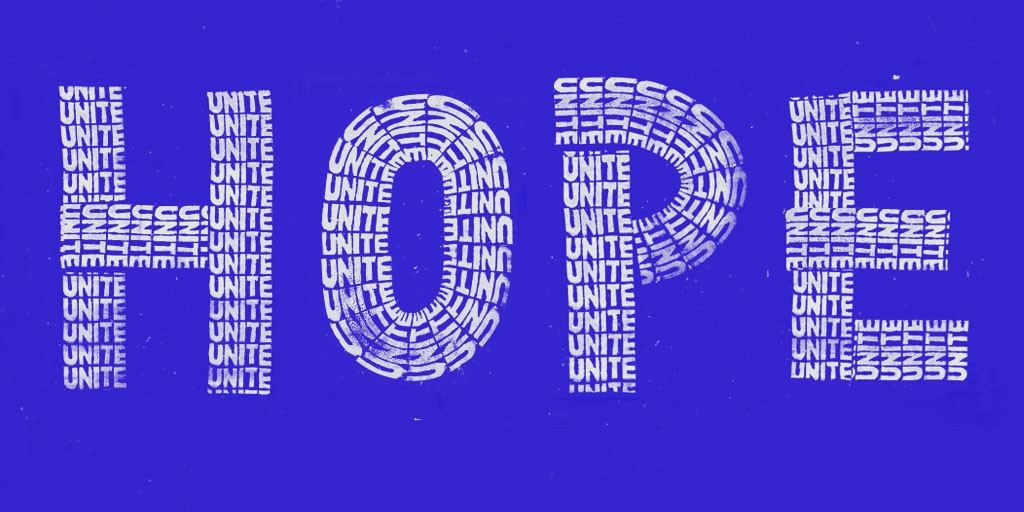

"Hope is not an illusion, it is about showing the tools for what you can actually do"
On 29 and 30 March, European Spaces of Culture was joined by Fine Acts for an interactive webinar on hope-based communication to support the 8 project teams working on the implementation of their projects in 2023.


Throughout the implementation process of the 8 pilot projects selected for the phase 3 of European Spaces of Culture, the project teams are supported by EUNIC with a series of online labs, each dedicated to a specific part of the project implementation cycle. This lab gave representatives of the project teams the chance to come together, learn and exchange about their experiences with hope-based communication. It was co-created and led by Fine Acts, a global creative studio for social impact that operates across issues and borders and believes in the power of art and play. Together with the Fine Acts team and the European Spaces of Culture project teams, the lab explored the principles of hope-based communication and how it can be a useful component for the success of European Spaces of Culture.
What is hope-based communication?
Svetla Baeva and Yana Buhrer Tavanier from the Fine Acts team gave the project teams a brief but detailed overview of the principles of hope-based communication and the work of Fine Acts in consulting and training civil society organizations in creative thinking, utilizing art and embracing play as a tool for social change. Hope-based communication is an open-source methodology designed by communication expert Thomas Coombes. It is a pragmatic approach to making communication around human-rights topics more effectively by focusing on uniting the audience with clear values and creating a hopeful vision for the future. Strong visuals are key in supporting a hopeful message. But why do we need hope? While the idea of hope is rooted in the idea that the future might bring positive change, it must not be confused with "simply being happy". It is a "pragmatic strategy for change" and does not ignore pain and suffering but is about "finding a way that our audiences can constructively and respectfully engage with the experiences of others". This means that societal problems and human rights violations can and should still be talked about, but be framed in the context of the solutions to them. A hope-based message should get the audience to think about how things could be instead and inspire them to take action.
The five shifts
Thomas Coombes promotes five shifts that can be made to improve communication based on hope:
- From "fear" to "hope";
- From "problem" to "solution";
- From "against" to "for";
- From "threat" to "opportunity";
- From "victim" to "hero" or "human"
Hope-based communication for European Spaces of Culture
The principles of hope-based communication are much in line with what European Spaces of Culture stands for: finding and testing innovative collaboration models for cultural relations and building partnerships based on dialogue, equality, mutual listening and learning. Already in 2021, in the second round of European Spaces of Culture projects, we encouraged the project teams to familiarize themselves with the principles of hope-based communication. With the support of Fine Acts as experts on the subject, the lab showed how applying hope-based communication can look like in practice for European Spaces of Culture. As alumni of the second round of project implementations, the lab welcomed representatives of "PoN! - A Ilha dos Tatus" from Brazil, a project that developed a mobile game to engage, inspire and connect brazilian youth in climate action. Julia Travieso and Monique Nascimento reflected on the experiemental process of finding a way to integrate a hope-based approach into the communication strategy for the project. They noted that while initially unsure how to approach the task, the principles fit very well with the nature of the game, as "it is inherently hopeful". Within the exisiting discourse of fear and "doomsday" messages around the climate crisis especially in the sector of online creators in the gaming industry, a strategy for hope was inevitable. Extending the visuals from the game to social media communication helped to attract the right audience and shifted the feeling of fear to hope.
Hope is not an illusion, it is about showing the tools for what you can actually do.
Julia Travieso, PoN! - A Ilha dos Tatus
From the current round of European Spaces of Culture projects, David Avido and Diana Muiruri from the "Kibera Fashion Week" project in Kenya gave a short insight into their experience so far with implementing a hope-based communication approach. The project is building a platform for local creatives in Kenya to redefine fashion, share new methods for sustainability and bring together stakeholders from around the world to challenge unethical and exploitative consumption. With a hope-based communication strategy, the project will rely on visuals, in the form of videos, to capture the success of the project activities. It opens up the possibility for the local community to express themselves and set their own agenda for sustainable fashion.
Kibera Fashion Week invites people from small businesses to express their experiences and talk about what they want to achieve.
David Avido, Kibera Fashion Week
Following the introduction to hope-based communication, the lab gave the opportunity to the project teams to work on reframing the main issue or challenge their project addresses, using the five hope-based comms shifts. Albeit a short exercise, the project teams had fruitful exchanges about the specific shifts that can be made in current messaging. For example, the project team of the "The Restoration Toolbox" in India, identified a possible shift from "threat" to "opportunity" by shifting from The urban environment will degrade, there is a threat of pollution and a loss of identity" to "We need to get people to build on their idea and create their own ways to care about their neighbourhoods". Not all of these shifts are easy to make and require more in-depth work, but particiapants welcomed this first exercise to jump-start a hope-based communication strategy.
A big thanks goes to Fine Acts for leading this brilliant introduction to hope-based communication and the rich discussions! We look forward to working together in the future and keeping up with implementing hope-based communication in the work of European Spaces of Culture.
